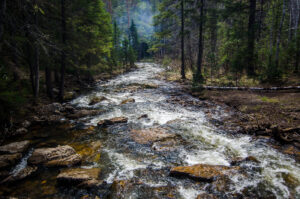Study Shows New Health Benefits From Forests

The benefits of ancient Asian medicine has become increasingly popular in recent years. The local cultures are well known for historically having a close relationship with nature and using various local plants to treat specific medical problems. In the US, the Native Americans were known to chew on the bark of the willow tree when they had a tooth ache. The bark of willow contains salicin, which is a chemical similar to aspirin (acetylsalicylic acid). In combination with its anti-inflammatory compounds (i.e., flavonoids), salicin is thought to be responsible for the pain-relieving and anti-inflammatory effects of the tree. Plant taxonomists will note that the genus of willow is Salix and hence the derivation of the name of the acid from the tree.
In recent years, there has been an increased interest in forests and natural settings as a means to expeditite the healing process in hospital patients. In short, patients will a scenic view tend to heal faster than those with a view of a parking lot. This concept has been expanded in a recent Japanese study. The Japanese practice of forest bathing is proven to lower heart rate and blood pressure, reduce stress hormone production, boost the immune system, and improve overall feelings of wellbeing.
Forest bathing is simply being in the presence of trees. It became part of a national public health program in Japan in 1982 when the forestry ministry coined the phrase shinrin-yoku. Nature appreciation—picnicking en masse under the cherry blossoms, for example—is a national pastime in Japan, so forest bathing became popular.
Forest bathing works similarly: Just be with trees. The point is to relax rather than trying to accomplish anything such as hiking. Ephrat Livni recently reported in the website Quart that from 2004 to 2012, Japanese officials studied the physiological and psychological effects of forest bathing, designating 48 therapy trails based on the results. Qing Li, a professor at Nippon Medical School in Tokyo, measured the activity of human natural killer (NK) cells in the immune system before and after exposure to the woods. These cells provide rapid responses to viral-infected cells and respond to tumor formation, and are associated with immune system health and cancer prevention. In a 2009 study Li’s subjects showed significant increases in NK cell activity in the week after a forest visit, and positive effects lasted a month following each weekend in the woods.
The study believes that this is due to various essential oils, generally called phytoncide, found in wood, plants, and some fruit and vegetables, which trees emit to protect themselves from germs and insects. Forest air doesn’t just feel fresher and better—inhaling phytoncide seems to actually improve immune system function.
Experiments on forest bathing conducted by the Center for Environment, Health and Field Sciences in Japan’s Chiba University measured its physiological effects on 280 subjects in their early 20s. The team measured the subjects’ salivary cortisol (which increases with stress), blood pressure, pulse rate, and heart rate variability during a day in the city and compared those to the same biometrics taken during a day with a 30-minute forest visit. “Forest environments promote lower concentrations of cortisol, lower pulse rate, lower blood pressure, greater parasympathetic nerve activity, and lower sympathetic nerve activity than do city environments,” the study concluded.
In other words, being in nature made subjects, physiologically, less worried. Subjects were more rested and less inclined to stress after a forest bath. Trees soothe the spirit too. A study on forest bathing’s psychological effects surveyed 498 healthy volunteers, twice in a forest and twice in control environments. The subjects showed significantly reduced hostility and depression scores, coupled with increased liveliness, after exposure to trees. “Accordingly,” the researchers wrote, “forest environments can be viewed as therapeutic landscapes.”
Meet the Author
Dr. Todd Shupe is the President of Wood Science Consulting, LLC. He is a well-recognized expert on wood forensics, wood preservation, wood decay and degradation, and wood species identification. He has a broad background in new product development, quality management, and marketing and sales in both the public and private sectors. For more information please visit DrToddShupe.com.
We welcome your comments below.
Thank you for visiting. We trust that you have enjoyed reading our articles.
Liked this post? Read more below or search for more topics . . .

